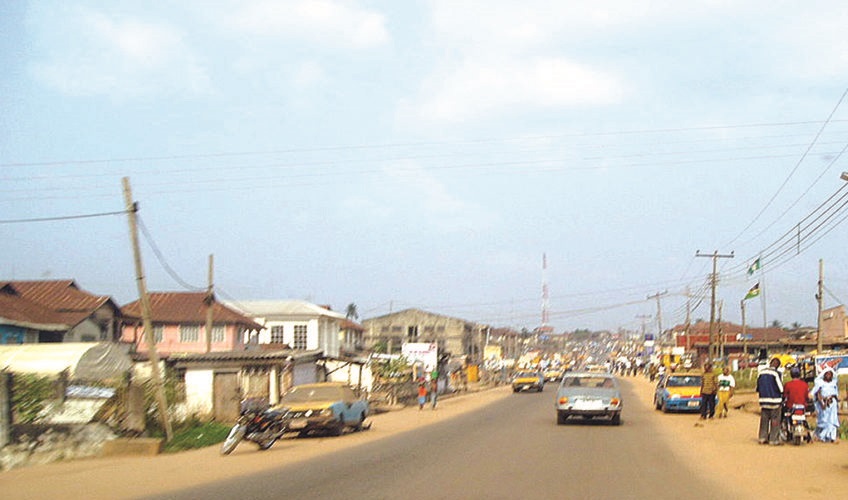 |
| Akure |
An Appeal Court sitting in Akure, the Ondo State capital, has affirmed the sacking of the traditional ruler of Igbindo community in Ondo West Local Government Area of the state, Oba John Olaniji Ogundoju, saying he was not eligible to contest the stool.
The court asked Ogundoju to vacate the stool and stop parading himself as the traditional ruler of the community and ordered the ruling house to start a fresh process of electing a new monarch for the town.
Ogundolu was, in 2015, removed by the state High Court barely two weeks after he was presented the staff of office by the Ondo State government, the action he challenged at the appellate court.
The legal battle began in the community when some princes from Ogbowo Okun Ruling House, led by Adetutu Ifashole and Okunade Makinde Fashole, dragged Ogundoju and four others to court over his eligibility to contest the vacant stool of the Akinnuwa of Igbindo town.
The litigants also included the chairman of the ruling house, Adeseeke Adewale Stephen, secretary of the ruling house, Joseph Olamodimu, Adeodi Adebayo and Taye Akinkugbe to the suit.
The princes prayed the court to declare Ogundoju ineligible to be the monarch of the town on the ground that he was from the female lineage of the ruling house, when the custom and tradition to ascend the throne allows persons from only the male lineage.
Justice Bode Adegbehingbe of the trial court admitted the prayer of the plaintiffs and ordered the removal of Ogundoju as the monarch of the community.
However, not satisfied with the judgment of the high court, the embattled traditional ruler proceeded to the appellate court to challenge the high court ruling through his counsel, Kunle Adetowubo.
In a three hours judgment delivered in the court, Justice Mohammed Danjuma, who read the judgment on behalf of other members of the panel, upheld the previous judgment of the high court and based his judgment on the fact and evidence produced by parties involved in the matter, thereby dismissing the appeal for lack of merit.
He said: “On the basis of the facts and evidence adduced by parties in the case and the authorities cited, it is my finding that the decision of the learned trial court on this issue was in order. It is resolved against the appellants and in favour of the respondents.
“Having resolved all the three issues raised herein against the appellants, the result is that the appeal lacks merit and it is accordingly dismissed. The judgment of the High Court of Ondo State is hereby upheld.”
In this article:
The court asked Ogundoju to vacate the stool and stop parading himself as the traditional ruler of the community and ordered the ruling house to start a fresh process of electing a new monarch for the town.
Ogundolu was, in 2015, removed by the state High Court barely two weeks after he was presented the staff of office by the Ondo State government, the action he challenged at the appellate court.
The legal battle began in the community when some princes from Ogbowo Okun Ruling House, led by Adetutu Ifashole and Okunade Makinde Fashole, dragged Ogundoju and four others to court over his eligibility to contest the vacant stool of the Akinnuwa of Igbindo town.
The litigants also included the chairman of the ruling house, Adeseeke Adewale Stephen, secretary of the ruling house, Joseph Olamodimu, Adeodi Adebayo and Taye Akinkugbe to the suit.
The princes prayed the court to declare Ogundoju ineligible to be the monarch of the town on the ground that he was from the female lineage of the ruling house, when the custom and tradition to ascend the throne allows persons from only the male lineage.
Justice Bode Adegbehingbe of the trial court admitted the prayer of the plaintiffs and ordered the removal of Ogundoju as the monarch of the community.
However, not satisfied with the judgment of the high court, the embattled traditional ruler proceeded to the appellate court to challenge the high court ruling through his counsel, Kunle Adetowubo.
In a three hours judgment delivered in the court, Justice Mohammed Danjuma, who read the judgment on behalf of other members of the panel, upheld the previous judgment of the high court and based his judgment on the fact and evidence produced by parties involved in the matter, thereby dismissing the appeal for lack of merit.
He said: “On the basis of the facts and evidence adduced by parties in the case and the authorities cited, it is my finding that the decision of the learned trial court on this issue was in order. It is resolved against the appellants and in favour of the respondents.
“Having resolved all the three issues raised herein against the appellants, the result is that the appeal lacks merit and it is accordingly dismissed. The judgment of the High Court of Ondo State is hereby upheld.”
In this article:
